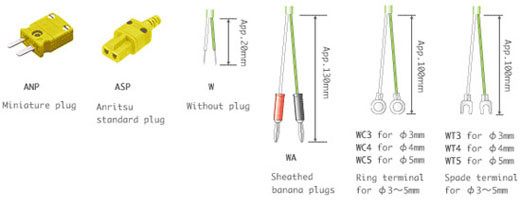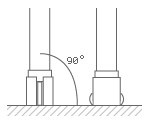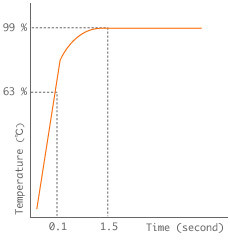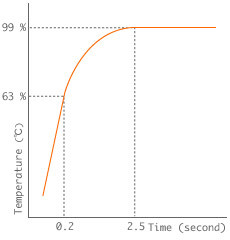Technical Guide
- THERMOCOUPLE TYPE
- CONNECTION
- CABLE TYPE
- TOLERANCE
- THERMOCOUPLE TOLERANCE
- PROBE TOLERANCE MEASURING CONDITIONS
- RESPONSE TIME
- PROBE RESPONSE TIME MEASURING CONDITIONS
- RESPONSE CURVE
- DURABILITY
- STATIONARY SURFACE TEMPERATURE PROBES
- MOVING/ROTATING SURFACE TEMPERATURE PROBES
- LIQUID OR GAS TEMPERATURE PROBES
- OPERATING TEMPERATURE LIMIT
- ABOUT PRODUCTS MADE OF POLYMIDE
THERMOCOUPLE TYPE
Standard ANRITSU Meter products are designed to use Type-K or Type-E thermocouples. Please note that the main thermometer unit must be connected to a probe of the designed type for accurate temperature measurements. ANRITSU can also produce certain models for use with Type-J or Type-T thermocouples.
| Type | Former Symbol | Composing materials |
|---|---|---|
| K | CA | (+) : Chromel (-) : Alumel |
| E | CRC | (+) : Chromel (-) : Constantan |
| J | IC | (+) : Iron (-) : Constantan |
| T | CC | (+) : Copper (-) : Constantan |
| R | (PR) | (+) : Platinum / 13% Phodium (-) : Pure Platinum |
CONNECTION

Standard ANRITSU meter products are designed to use either the ASP or ANP plug. Please note that the main thermometer unit and probe must have the same connector types. ANRITSU can also produce certain probe models with the following connector types.
* WA, WC, and WT are made of generally available electrical materials.Note that temperature changes in these parts may result in measurement errors.
CABLE TYPE
For information on standard probe compensating lead wires ( cords ), please refer to the probe pages.ANRITSU can also produce certain probe models with the following compensating lead wires.
| Model | Outer diameter Conductor | Sheath Material | Heat Resistance | Resistance | Feature |
|---|---|---|---|---|---|
| TS-K / E | φ2.3mm 7 / 0.1 × 2 | Slicone rubber | 240°C | K: 18Ω / m E: 22Ω / m |
Thin, Flexible |
| TF-K / E | φ2.3mm 7 / 0.1 × 2 | Teflon | 230°C | K: 19Ω / m E: 22Ω / m |
Resistant to chemicals |
| TC-K / E | φ4.0mm 14 / 0.1 × 2 | Slicone rubber | 240°C | K: 9Ω / m E: 11Ω / m |
Flexible |
| TCG-K / E | φ4.5mm 14 / 0.1 × 2 | Silicone rubber with Stainless Steel | 240°C | K: 9Ω / m E: 11Ω / m |
Flexible, Resistant to external damage |
| GW-K / E | φ2.3mm 7 / 0.32 × 2 | Glass fiber | 300°C | K: 11Ω / m E: 14Ω / m |
Highly resistance to heat |
| SG-K / E | φ3.0mm 7 / 0.65 × 2 | Glass fiber with Stainless Steel | 400°C | K: 3Ω / m E: 3.6Ω / m |
Moderate hardness Highly resistnace to heat Resistant to external damage |
| TPC-K / E | φ3.3mm 14 / 0.1 × 2 | Polyurethane | 110°C | K: 18Ω / m E: 22Ω / m |
Coiled cord contraction / extension range : 0.3 to 1.5m |
*[14/0.1×2] in the conductor column indicates that the cord contains two conductor wires (one pair).Each conductor wire is twisted and composed of 14 0.1-mm-diameter wire strands.
TOLERANCE
The thermocouples used in ANRITSU Meter products comply with the Class 2 tolerance standards specified within the Japanese Industrial Standard JIS C1602-1995.
However, since the structure of probes and other factors can affect the tolerance of specific temperature measuring probes, please refer to the pertinent pages for information on the precision of specific probes.
THERMOCOUPLE TOLERANCE
| Type | Measureing Temperature | Tolerance |
|---|---|---|
| K | at 333 to 1200°C at -40 to 333°C |
±0.75% of measured temperature ±2.5°C |
| E | at 333 to 900°C at -40 to 333°C |
±0.75% of measured temperature ±2.5°C |
PROBE TOLERANCE MEASURING CONDITIONS
| Specification indicated in catalog | At 100°C Surface | At 100°C |
|---|---|---|
| Test temperature | 100°C | 100°C |
| Probe application | Stationary surface probes Moving / rotating surface probes | Internal probes Air / gas probes |
| Test method | Measurement of stationary metal surface temperatures | Measurement of boiling water by immersion Measurement of steam temperatures |

The tolerance of surface probes can vary significantly depending on measuring conditions, measurement target, and the nature of the contact between the probe and measurement target. When using a probe, make sure the sensor head correctly contacts target surface.
RESPONSE TIME
The response time given for our temperature measuring probes is the time required to detect 99% of the true value.
PROBE RESPONSE TIME MEASURING CONDITIONS
| Probe application | Test method |
|---|---|
| Stationay Surface Probes Moving / Rotatin Surface Probes | Measurement of stationary metal surface temperature |
| Internal Probes | Measurement of boiling water by immersion |
| Air / Gas Probes | Measurement of steam temperature |
RESPONSE CURVE

ex) Stationary Surface Probes : N-213K

ex) Internal Probes : BS-21K
DURABILITY
The probe product pages use the following symbols to indicate probe durability. Please note that probe durability can vary significantly depending on actual conditions of use.
| Durability Rank | Staitionary Surface Temperature Probes | Moving / Rotating Surface Temperature Probes | Liquid or Gas Temperature Probes |
|---|---|---|---|
| A | More than 50,000 contacts | More than 1500 hours cotinuously | Long lived (indefinable) |
| B | More than 10,000 contacts | More than 1,000 hours continuosly | over 1 year |
| C | More than 5,000 contacts | More than 500 hours continuously | over 6 months |
| D | Less than 5,000 contacts | Less than 500 hours continuously | Less than 6 months |
| S | unavailable due to special appcilation | unavailable due to special appcilation |
STATIONARY SURFACE TEMPERATURE PROBES
Number of contacts enabling measurement within the accuracy range on a flat and smooth metal surface at a temperature of 300°C(or at the operating temperature limit if the operating temperature limit is below 300°C).
MOVING / ROTATING SURFACE TEMPERATURE PROBES
Time period in which measurement was achieved within the accuracy range, on a flat and smooth metal surface moving at a rate of 200 m/min.
LIQUID OR GAS TEMPERATURE PROBES
When used correctly, virtually no deterioration occurs in these products due to temperature measuring operations. Therefore, the durability ranking is based on the ease with which impact results in damage.
OPERATING TEMPERATURE LIMIT
The operating temperature limit is determined by the allowable temperature limit of the sensor head contacts the measurement target. Please note that the operating temperature limit is not the same as the allowable temperature limits of the grip, cord, and plug. Probes are more easily damaged at the temperature of below 0°C, due to frost adhesion, reduced elasticity constant, and other factors.
ABOUT PRODUCTS MADE OF POLYMIDE
Some ANRITSU products are made of polyimide. Since polyimide may adversely affect humans, avoid using such products in applications where they may come into contact with foods, internal organs, or bodily fluids.
